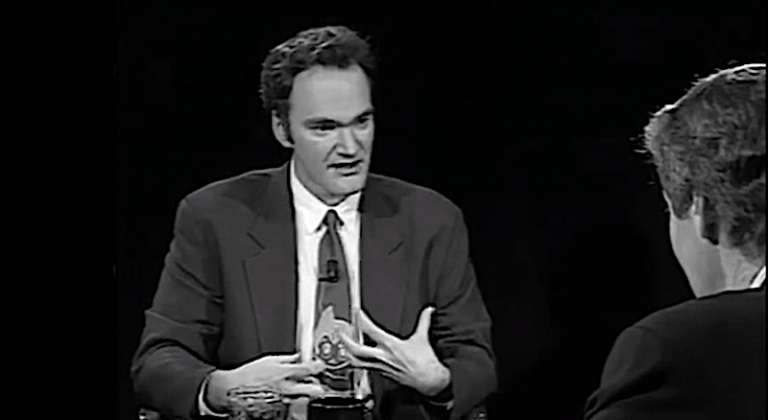By Ken Miyamoto · January 6, 2020

What screenwriting advice did Quentin Tarantino offer during his Reservoir Dogs and Pulp Fiction days?
Download the screenplay for PULP FICTION here for free.
Welcome to our ongoing Learning from the Masters and Industry Insiders series where we seek out and feature excellent videos, interviews, and discussions of the art, craft, and business of screenwriting and pull the best words of wisdom, writing tips, and screenwriting advice.
We turn to Quentin Tarantino’s interview with Charlie Rose early on in his career as he discusses a key point of screenwriting advice that screenwriters can learn from. We then elaborate on those points to showcase how screenwriters can apply these points to their own screenwriting journey.
“All of my writing techniques — I never took any writing classes, writing seminars, or read any pamphlets — my whole thing was, everything I learned as an actor studying acting for six years, I basically applied to writing.”
Tarantino points to how acting lessons can inform a writer just as much. It’s all about bringing yourself and your experiences into the mix. For an actor, it’s for their performance. For a writer, it’s for creating stories and characters embedded within you and your experiences in life.
“If I’m [acting in a play] in a theatre production, and I’m driving my way to the theatre, and I hit a dog on the way to the theatre that night. That doesn’t make you commit suicide, killing a dog, but it’s going to affect you. Now I’m affected by that. Now, the thing is, when I go out on stage, I have to bring that experience on with me or what am I doing out there… this doesn’t mean the play suddenly becomes about a dead dog. But I’m not there unless I bring that on with me and make that work inside of the material.”
One of the most misunderstood pieces of screenwriting advice is, “Write what you know.” Screenwriters take that too literally and believe that they should only be writing personal stories that they themselves have experienced. That’s not the point. The point is to take what you know in your life — emotions, experiences, perspectives, and beliefs — and inject them into the story that you choose to write.
It could be fantasy or action spectacle — obvious genres that you clearly have never experienced in real life. However, you can take elements from your life and apply them to those types of stories.
“To me, all of [my] movies are very personal. And I don’t mean I’m some crook. But the thing about it though will be that this group of friends will look at it and be like, ‘Oh Quen, I can’t believe you talked about that…’ and this old girlfriend will be like, ‘Oh Quen! Oh, jeez…'”
That’s what makes a screenplay feel real and truthful.
“You should have this voice inside of you saying, ‘Tell the truth. Tell the truth. Tell the truth.'”
Excellent advice from a talented young filmmaker and now iconic auteur master.
Watch the whole exchange to see a young Quentin Tarantino speak the truth about writing!
For all the latest from The Script Lab, be sure to follow us on Twitter, Facebook, and Instagram.
And become a member of TSL 360 to enjoy the LARGEST screenwriting education content library, featuring masterclasses, deep-dive interviews, and lectures from Academy Award-winning screenwriters, TV show-runners, producers, literary managers, agents, studio executives, and leading educators – all in one place.